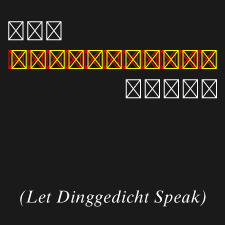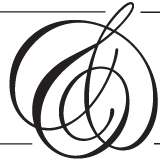
 |
Vol XLV, Let Dinggedicht SpeakDesmond Kon Zhicheng-Mingdé
|
JUMP2CONTENTS
1. Dinggedicht Said Questions Please
3: Dinggedicht Said Pleasure Principle
It is not enough… to repeat the empty
affirmation that the author has disappeared….
Instead, we must locate the space left empty by
the author’s disappearance, follow the distribution
of gaps and breaches, and watch for the openings
that this disappearance uncovers.
Michel Foucault
![]()
Dinggedicht Said Questions Please
In the chiaroscuro, Desmond Kon (Donglã-Xiche) asked Desmond Kon (Donglín-Xizhao) this question: “Who will show you the difference between goat milk and yak milk now that postmodernism is dead, and playing possum too?” It was optimum poison aimed to hurt, to hit sweet home like Celan as his field mouse, a “bite through the shirt into my skin.” “First of all,” Celan replied in a calm eschatological register, “I would have been dead forty years this year, and looks to me like everyone has to life-surf in the downturn, and longboarding on the Grand Tour can mean struggles and hard-nubuck lessons, and believe or don’t believe every utility thing you see and reread, and please parcel out the illusory from the history like wheat germ from the chaff, and please stop emasculating theory and your id and every tempera thing in between, and please, please, everybody needs a good guffaw once in a footprint while, and postmodernism doesn’t die, thank Lyotard and Blanchot very much, at least not in my post-logocentric book, and haven’t you heard of the post-post-post-postman’s metaphor that arrives yet never arrives as author-intended, like Derrida and that phenomenal Postcard, prodigious and kernel wisdom within book covers, like Charles Saatchi when he says with the snappiness of a post-it, ‘Some people like the art, some people like being shocked by it. Everyone’s happy.’ ”
![]()
Dinggedicht Said Namaste
Once, in a smoothie café, a man in a suit with super-wide lapels leaned over frighteningly close to say this: “Hey, you must be a self-loathing coolie off your junk, reading that art book on Alberto Giacometti.” I was on the double-page spread that showed Giacometti’s 1956 Nine Standing Figures. Thank goodness Patanjali’s Yoga-sutra was by my side, beside a four-cheese pizza and garlic fingers. “I’m about the love,” I replied, grabbed my books and headed for home on the chicory line. I stopped halfway to sit on a park bench, make-believing I was at a pizzeria, continued to read my book under the overlapping shade of three trees, probably a Turkish Filbert, Italian Cypress and Chinese Elm. The new page was another secondhand impression, had a photograph of Giacometti’s 1933 No More Play, a heart-stopping work of marble, wood and bronze, that made me want to be a better man. “Logic or language?” These relapses into the center lap up Desmond Kon (Bianpì-Ruli), who drinks tap water, carries a collapsible shopping bag, and recently dropped off old clothes to a fabric artist who recycles J-Pop streetwear, ever since switching to energy-saving bulbs, and now lining drawers with tear-outs from Real Simple another friend offloads at this no-frills walk-up. Bianpì-Ruli likes these long walks because they help him forget and remember, a phenomenon he finally surmised yesterday: “Every sentence of mine has been no more and no less a question, begging its fragile beginnings and hoping for a temporary answer, of that bas-relief like St. Elmo’s fire in the next few seconds. It hovered over every square patch of grass behind the threshing barn, its gambrel roof as luminous as bluebells.”
![]()
Dinggedicht Said Pleasure Principle
In the fresco, Desmond Kon (Fangdàng-Buji) asked Desmond Kon (Fanglang-Xínghai) this question: “That CSL tutor just saw your Club Monaco tote and dangled a wad of blue notes, hollered with candor – why not work the gigolo thang, whore yourself at Joo Chiat and Changi Village?” He crushed up that essay on how Heidegger and Lévi-Strauss and Althusser and Foucault and Derrida were all more likely companion sojourners rowing the same love boat toward an end only others could follow through – years of penmanship fell into the wastepaper basket, more suburban scribes cuddling their Richard Rorty, his Philosophy and Social Hope slipped underneath yesterday’s forgettable news and some month’s edition of The Economist. Someone else’s jester should have bought that tutor tickets for Belle du jour, Mighty Aphrodite, Moulin Rouge, Leaving Las Vegas, Kiss of the Dragon, House of Flying Daggers, Shoot ’Em Up, and Burnt Money or Plata Quemada, the Marcelo Piñeyro-directed film based on famed Argentine writer Ricardo Piglia’s equally astounding novel, and starring the completely delectable Leonardo Sbaraglia and Eduardo Noriega, their shared vessel moment as distant yet intimate as as a cosmopolitan Bueno Aires for all its anomie. Or that pugilist could have just mastered wielding the kyoketsu shoge, the way Rain does in Ninja Assassin – then again he was more free sparring and side kicks, dash of bayonet fighting self-taught between math and dance class back in the days. Backpack and duffle bag dropped to open sides, he adopted the seven-star stance, his bow stance certainly helping, fending off the three smooth-talking thugs ready to jump him behind the popsicle cart. That one time – it was 1963 – stereotypes came in handy, like pest control. I think I was Desmond Kon (Shiwú-Qianli) then, beaten up, then rescued, stick figure of thousand paper cuts at eye level, bruised face demanding new paper doll accessories.
![]()
Dinggedicht Said Love This
I woke up today to abstinence, refraining from crack-of-dawn sex, because libido is ab-fantastic for tapping the Orphic muse. I’ll be sleeping in my own Murphy bed tonight, alone, what with this inner city retreat expecting lights-out at nine. Not a pickle situation, given that 70% of art historiographers in this Abstract Expressionist painting coop up in public housing, albeit in living spaces ranging from a Glory-box studio to a double-storeyed apartment. Think of them as high-rise villages, tiered but loosely bound, and perfect for what I’m calling “Sandwich Wallism: The Poetics of Confined Spaces”. It’s myo-nouveau theory, percolating like my partner’s prose after reading After Poststructuralism: Reading, Stories and Theory, thank every dreamy notion for Colin Davis, his staggering, dripping intellect like Wittgenstein writing into his notebook, “It all depends on settling what distinguishes the proposition from the mere picture”. Who said “let Jeremy Bentham floss in private behind black-out curtains in his Pleasantville model home of Truman-Show proportions?” Who will walk in with Wallace Stevens and together intone: “Say that it is a crude effect, black reds, / Pink yellows, orange whites, too much as they are / To be anything else in the sunlight of the room.”
![]()
Dinggedicht Said Metaphor
Seen centuries ago, in this very field of rooms, the meeting tired itself out, having to discourse with various sexually repressed individuals who thought they were sexually confident. Maybe they made feel-good indie flicks for therapy-by-numbers so these individuals could come out to their heterosexuality, homosexuality, bisexuality, self-pleasuring metrosexuality, quasi-sexuality, phylosexuality, loco/robosexuality, B2B/P2P cuddle-party sexuality that starts with smirting and ends with a night-long snuggle, and Joseph Stella let liquid more languor, cartwheel of light, spinning into Coney Island in the high heat of summer. “Don’t go to the openwork poet for knowledge,” the avatar with the tall hat said, after gazing at the painting of a lightship trapped in a squall, the ship moored like a houseboat but the lights a caterwauling cacophony. “That’s what philosophers accord like a pocket watch handed down,” the unidentified Futurist said at the meeting, standing on a chair, “all parts musical and precious functions. No, you go to the poet only for beauty.” He pointed to the celery leaf that he watched fly out the kitchen window in the afternoon, sit on his front lawn, twirl down the pavement toward the mining pond with an eddy, yet somehow end up on his bedside table by nightfall. Beside it was another bit of leaf, a hydrangea, compassing. That’s when Kharms found a new appetite – the tropopause – as he circled in one strong stir what Stephen Dunn had to say in four clauses over three slow lines: “Nothing in nature is a metaphor. / Everything is. I thought both thoughts. / And knew inexactly why I felt sad.”
![]()
Dinggedicht Said Move Over
Just now, Desmond Kon (Shangxin-Yuèmu) asked Desmond Kon (Zixu-Wuyǒu) this question: “Do you believe in purple prose or do you just like the cover of Tzvetan Todorov’s Symbolism and Interpretation?” To which I replied matter-of-factly, “Look, over there, purple angularity in that sign, purple haze in your Jimi Hendrix eye, purple in that lenticulus cloud in this evening sky. Look, look, purple like a petunia over my Smoky Martini, its soft four-petal crunch the same way Philip Guston told me wild strawberries go splendidly with pink champagne. Purple in peach schnapps in my Fuck-Me-Sideways recipe, purple in magenta which likely accounts for every other CMYK colour between Gutenberg and Serkland’s Acrobat, hand-built before the velvet stripes over perfect terra sig. Look, purple in your Donegal Tweed, purple in your purple yoga mat beside purple pilates unitard, purple on Lady Gaga and her ‘Speechless’ and ‘So Happy I Could Die’ that you have on repeat, over and over again, till I go purple-and-blue in this pixellating long-ago face. Purple purpling like clarity and pride and a parade all over Van Gogh’s oils, his lavender orchard softly trundling, undulation upon undulation, its purple aslant, looking out into Arles.”
![]()
Dinggedicht Said Kafka
“I am the long-breve movement like eternity, and two jump cuts to the ephemeral,” Desmond Kon (Momò-Wuwen) side-stepped his own thoughts to dribble lemon zest into the warming milk, pastry cream waiting like love notes penciled in the margins of Kafka’s 7 July diary entry – tell us more about the railway hotel in Jungborn, its open-track ruminations a frosting to his then-misery. None of the “truthiness” feelings these days, the way the mundane seems completely safe and microfiltered, sweet whey like another gift of humor and comprehension, yes? Yes, George Plimpton turned red as an embarrassed therapist in Good Will Hunting, and as himself in Factory Girl, but who knows about that Hemingway interview he did, the only other interview ever, historically, the same way John Frow fabulously wrote: “At the same time, no text is ever unframed, even if it is the case that the act of citation or of translation or merely survival from one moment in time to another all alter the generic framework within which texts are read?” In this curdling between black light and walkway shadows, the closest colloquialism we have to this is “emo,” not quite Colbert’s definition of “the good story” that is also reality-defying because of our pasteurizing obsession with wavelength authenticity to the point of frou frou, all-out trippin’ the light fandangle-fantastic. Maybe the old man is still melancholic and sunshades at sea, only in an endorheic basin, white mane of Beringian lions like breaking waves, color field painting on construction material like something solid and land-weary and charming as milk glass – this prewhitening shade of pale, bone ash or bone china to hold on to.
![]()
Dinggedicht Said Oatmeal
Desmond Kon (Mángwu-Touxu) asked Desmond Kon (Pangguan-Zhěqing) this question: “Please make love to me as if it were the end of the novel, the way David Gascoyne would have, in this burlesque day and age where it’s proper to not believe in irony but live it, out loud nonetheless. And literary relativism is a deep existential difficulty, like Einstein counting sugar grains for the boiling oats, I mean seriously.” Apologies, but this is an artificial lake – nothing natural or romantic about it, like one of those crater lakes – where freedom of expression is not something writers take for granted, writers who both value and hunt-and-gather beyond the generative and mimetic. In these places, literary irreal-relativism provides sanctuary, a safe house in which our texts can find a sheltering atmosphere and breathing room in the permafrost. Especially in places where literalism seems paralyzing rife and to rule the day, a keen sense of being comfortable with not ever completely knowing anything is always refreshing, humbling and reassuring, as fiber and fruit. How Daniil Kharms disappeared into the cereal wall like some Kafkaesque Catch-22? Not knowing helps the aging poet to better sleep at night, underneath a dream catcher of coral beads and egret plumes, knowing the rift-valley divide between analytic and continental philosophy suffered along with him, old as the tiles of his kitchen – better that than eking out an anxiety-ridden livelihood, dread-filled and misspent between a series of power naps. “Has everyone forgotten how to love and be loved?” My gaming crew asked in unison, another stir and giddying plunge.
![]()
Acknowledgments
The epigraph is taken from Foucault’s 1979 work, “What is an Author?”, in Textual Strategies: Perspectives in Post-Structuralist Criticism, edited by Josué V. Harari.
The Dinggedicht, translated as “thing poem”, is a type of poetry that explores objects from within rather than from without.
Earlier versions of these pieces first appeared in the following publications, to whose editors grateful acknowledgment is made: Everyday Genius, Metazen, Pindeldyboz.




